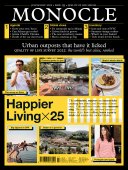
Issue 155
Where is the best place to live? What makes a city tick? How can we improve our lot? Monocle’s Quality of Life Survey has posed this question for the past 15 years and 2022’s July/August issue contains the latest. How does your city fare? Plus: hot looks, sunny stays and the perfect summer playlist.
In This Issue
Oops! No content was found.
Looks like we no longer have content for the page you're on. Perhaps try a search?
Return Home

